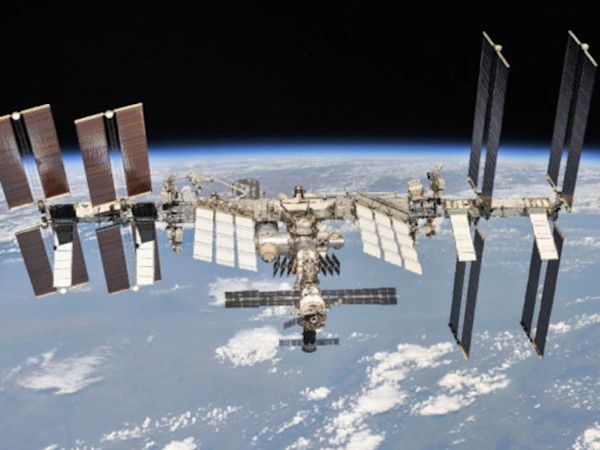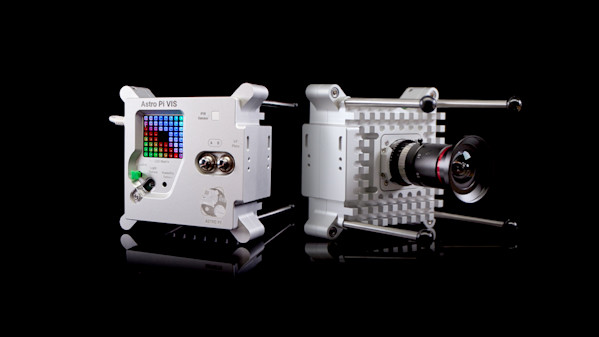Mission Space Lab
Mission Space Lab offers teams of young people the chance to run scientific experiments on board the International Space Station. Submissions for Mission Space Lab 2024/25 closed on 24 February 2025.
Mission Space Lab 2025/26 will open for submissions in September 2025.
- Age 19 and under
- Teams of 2-6
- Supervised by a mentor

How to take part
-
Check the eligibility criteria
-
Mentors sign up and register their teams
-
Teams write and test their programs
-
Mentors submit their teams’ programs.
Solve a scientific task in space
In Mission Space Lab teams are invited to write computer programs that solve a scientific task in space: to gather data to calculate the speed at which the International Space Station (ISS) is travelling as accurately as possible.
To achieve this, teams write a Python program to first use the Astro Pi computers’ sensors or camera and gather data about the orientation and motion of the ISS as it orbits the Earth, and then calculate the speed of the ISS based on the gathered data.
Taking part in Astro Pi Mission Space Lab enables young people to learn about the ISS, about gathering and using data to answer a scientific question, and about creating and troubleshooting a computer program. They also have the exciting opportunity to learn about the science of motion and the orbit of the ISS. Eligible programs will be deployed on the ISS, and teams will receive certificates and data collected in space.

The Astro Pi Computers
An Astro Pi computer is a Raspberry Pi computer equipped with a Sense HAT add-on board, a High Quality Camera, a Coral machine learning accelerator, and a hard casing designed especially for space travel. Its Sense HAT has a number of sensors that teams can choose to use to capture data
• A passive infrared sensor (PIR)
• A colour and luminosity sensor
• A gyroscope, accelerometer, and magnetometer inertial measurement unit (IMU) sensor
• A temperature sensor
• A humidity sensor
• A pressure sensor

Planning a Mission Space Lab program
To calculate the speed of the ISS, young people will need to learn about some scientific concepts, and about the ISS itself. Our short video with ESA Candidate Astronaut Rosemary Coogan explains more:
The Mission Space Lab creator guide gives young people an introduction to lots of the coding skills to create their Python program and get the output they need.
The ISS speed project guide demonstrates how teams can approach this year’s Mission using photos captured with the Astro Pi's camera. To get their speed estimate as accurate as possible, they will need to refine the program they can create by following this guide.
The Mission Space Lab rulebook lays out the up-to-date rules for the Mission Space Lab activity, including details of what your team's program must do and the technical requirements for it to achieve flight status and run on the ISS.
The Mission Space Lab mentor guide provides you as a mentor with everything you need to answer your team's questions and help them solve problems.
More information
Register your teams
Mentors register their teams. Each mentor receives a unique team ID for each team they register, which they need for submitting the team's finished program.
Write and test your programs
Teams write Python programs to accurately estimate the ISS’s speed. They test their program using a Python library we provide specially for Mission Space Lab teams. This library simulates their program’s run based on historic data from previous Astro Pi missions.
To write their Python program, teams can use any macOS, Windows, or Linux computer and any code editor or integrated development environment (IDE) that supports Python. Be aware that Astro Pi computers will not be provided as part of the Astro Pi Challenge. If teams wish, they can use their own Raspberry Pi to write and test their program.
Checklist for programs
Each program needs to meet some key criteria so it is possible to be run on the Astro Pis on board the ISS. There will be a checklist to help teams and mentors make sure a team’s program is ready to be submitted.
Submit teams' programs
Mentors submit a team’s completed and tested program using the unique link provided for each team they register

Project timeline 2024/2025
-
Challenge launch
16 September 2024
Mentors register their teams
-
Create
16 September 2024 – 24 February 2025
Teams write and test their programs
Mentors submit their teams' completed programs
Astro Pi Mission Control tests and assesses each submitted program
-
Deploy
April – May 2025
Programs that pass testing and assessment are awarded 'flight status' and deployed on board the ISS
-
Certificates
May – June 2025
Teams receive the data their program has gathered while running on the ISS, and a certificate of participation
Why participate in Mission Space Lab?
We asked some participants of Mission Space Lab how they feel about the challenge, and why it’s important to them.
“Astro Pi helped me to be creative and think about ways to use the devices and resources on board the ISS. It was really fun and I learned a lot about the ISS itself. The Astro Pi challenge motivated me to continue coding lessons in school and someday make computer sciences a part of my life.”
Alexandra, Team ISS Girls, age 16
“We had a great time working on Astro Pi. It strengthened our bonds of friendship as collaboration and teamwork is required to achieve this unique goal. We recommend Astro Pi to everybody who is interested in space to take part in this challenge. All difficulties you will encounter, will finally turn into benefits as you are going to learn how to overcome them. Don’t be afraid to be part of such an adventure — take your chance to become a space scientist!”
Team LAZOS22
“Participating in Mission Space Lab offers students a great opportunity to work with the International Space Station, to see the Earth from above, to challenge them to overcome the terrestrial limits.”
Mentor, Mission Space Lab 2023/24
"We want students to use their digital skills as superpowers to make the world a better place and this competition really aligns with that because regardless of your race, your ethnicity, your gender, you can write some code that actually runs in space. And if you can do that… you can solve the big problem[s] that the adults of the world are still grappling with, so it's opening up opportunities."
Mentor, Mission Space Lab 2023/2024